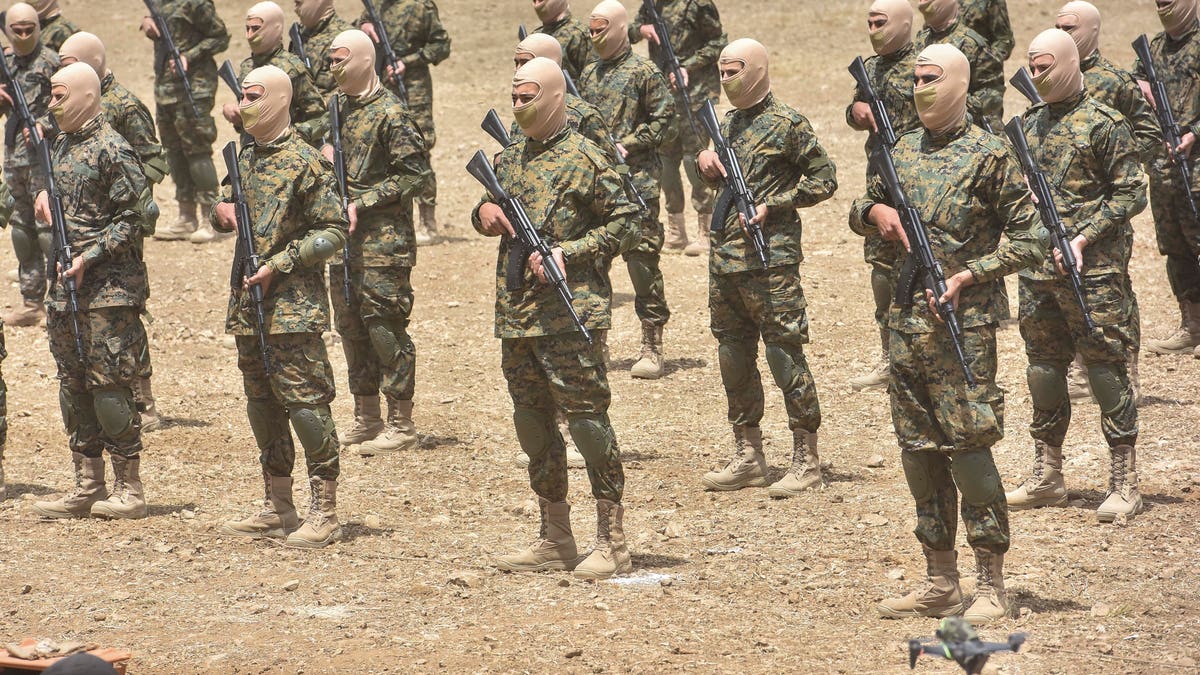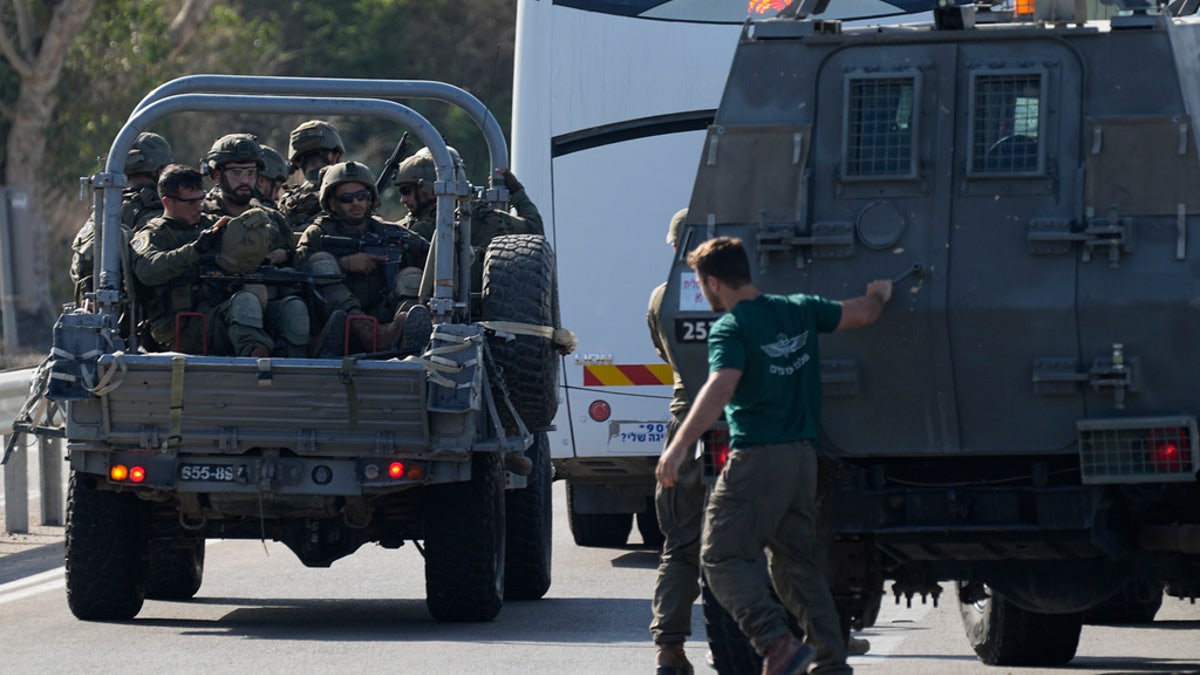The Israeli government faces another potential threat on its northern border: Lebanon’s Hezbollah. The Iran-backed militant group Hezbollah fired rockets at Israel Sunday, joining Hamas’ offensive attacks.
Hezbollah has previously clashed with Israel, leading to fears that the terror group may join the war with Hamas.
Are Hezbollah and Hamas allies?
Hamas and Hezbollah, both considered terrorist organizations by the U.S. government, share a goal of Israel’s destruction, but they are not the same group.
Hamas is an Iranian-backed Palestinian group designated as a Foreign Terrorist Organization (FTO). Hezbollah is a militant Lebanese group with a stronghold in southern Lebanon. Hezbollah is also backed by Iran.
HAMAS, HEZBOLLAH SAY IRAN HELPED PLAN DEADLY ATTACK ON ISRAEL: REPORT
While both groups have a shared mission to eradicate Israel, Hamas primarily focuses on establishing a Palestinian state. Hezbollah has a broader goal of bolstering Iranian objectives.
They also follow different sects of Islam. Hamas is mainly Sunni, and Hezbollah is a Shiite group.
U.N. peacekeepers patrol on the Lebanese side of the Lebanese-Israeli border in the southern village of Kfar Kila, with the Israeli town of Metula in the background, Lebanon, Monday, Oct. 9, 2023. Lebanese and Israeli army soldiers have gathered in larger numbers along the border Monday, the U.N.-drawn Blue Line, after Israeli troops and militant group Hezbollah exchanged shelling on Sunday. (AP Photo/Hassan Ammar)
Ali Barakeh, a senior Hamas official, has acknowledged that Hezbollah and Iran have helped Hamas in the past but claimed the group has worked alone on training fighters and building rockets since the 2014 Gaza war, according to the Associated Press. Barakeh said that as an ally, Hezbollah will join with Hamas if needed.
Senior Hezbollah official Hashem Safieddine claimed solidarity with Hamas in a statement following Saturday’s attacks, “Our history, our guns and our rockets are with you.”
WHAT IS HAMAS? AN OVERVIEW OF THE ISLAMIC GROUP THAT ATTACKED ISRAEL
Lebanese television station Hezbollah-run Al-Manar praised Hamas’ attacks against Israel as “crowned with triumph and divine assistance.”
Has Hezbollah attacked Israel in the current conflict?
Although not officially part of the war, Hezbollah fired 12 rockets into the highly disputed area of Mount Dov Sunday, according to senior Hezbollah official Hashim Safieddine. The shots followed Hamas’ attack on Israeli towns Saturday during Shemini Atzeret, a Jewish celebration marking the end of Sukkot.
ISRAEL AT WAR: SEE THE PHOTOS, VIDEO OF THE ATTACK AND AFTERMATH
Israel responded with shots into southern Lebanon, with no casualties reported.
Amir Avivi, CEO of the Israel Defense and Security Forum (IDSF), told Fox News Digital that the rockets were a “pinpointed” message from Hezbollah.

Lebanese Hezbollah fighters are taking part in cross-border raids, part of a large-scale military exercise, in Aaramta bordering Israel on May 21, 2023, ahead of the anniversary of Israel’s withdrawal from southern Lebanon in 2000. (Photo by Fadel Itani/NurPhoto via Getty Images)
Orna Mizrahi, a senior researcher at the Institute for National Security Studies in Tel Aviv, said the shooting seemed less like a declaration of war, but more of a vow of solidarity with Hamas. She said, “But there might be a temptation to take advantage of this opportunity.”
What does Hezbollah want?
Hezbollah was founded during the 15-year Lebanese Civil War that started in 1975. Iran and its Islamic Revolutionary Guard Corps (IRGC) provided funding and training to the group of Shiites who began fighting against Israeli forces. The group became known as Hezbollah, which means “The Party of God.”
The party’s original objective was to remove the Israel Defense Forces (IDF) from southern Lebanon. Although Israel withdrew its troops in 2000, Hezbollah justified its ongoing conflict based on Israel’s presence in Shebaa Farms, an area within the Lebanon-Syria-Israel border region.
WORLD LEADERS CONDEMN HAMAS FOR ‘UNPRECEDENTED’ ATTACK AS IRAN, HEZBOLLAH PRAISE TERRORISTS
A 1985 manifesto consecrated Hezbollah’s mission to expel Western influence from the Middle East and destroy the Israeli state. The manifesto listed Ayatollah Khomeini, the Iranian Islamic revolutionary, as its leader. Khomeini ruled Iran as its Supreme Leader from 1979 until his death in 1989.

Israeli soldiers prepared to fight against the threats of Hamas and Hezbollah (AP Photo/Ohad Zwigenberg)
Is Hezbollah a threat to the United States?
Hezbollah’s reach extends beyond the Middle East. The group is responsible for attacks and plots across Bulgaria, Peru, Cyprus, Thailand, Argentina and elsewhere. While Hezbollah has not succeeded with a terrorist attack in the United States, the group attempts to develop the ability to do so.
Hezbollah operates networks inside and outside Lebanon to execute various criminal activities, including a series of attacks against U.S. interests. These attacks included the 1983 Beirut barracks bombing. 241 United States Marines were killed in these suicide bombings; the deadliest day for the United States Marine Corps since the Battle of Iwo Jima in 1945.
Currently led by Hassan Nasrallah, the militant group has a history of carrying out terrorist attacks to support its mission stated in the manifesto. Tensions remain high after Hezbollah fought Israel in 2006, according to the CIA World Factbook. The war began when Hezbollah kidnapped two Isreali soldiers.
The Israeli military is prepared for confrontations with Hezbollah.